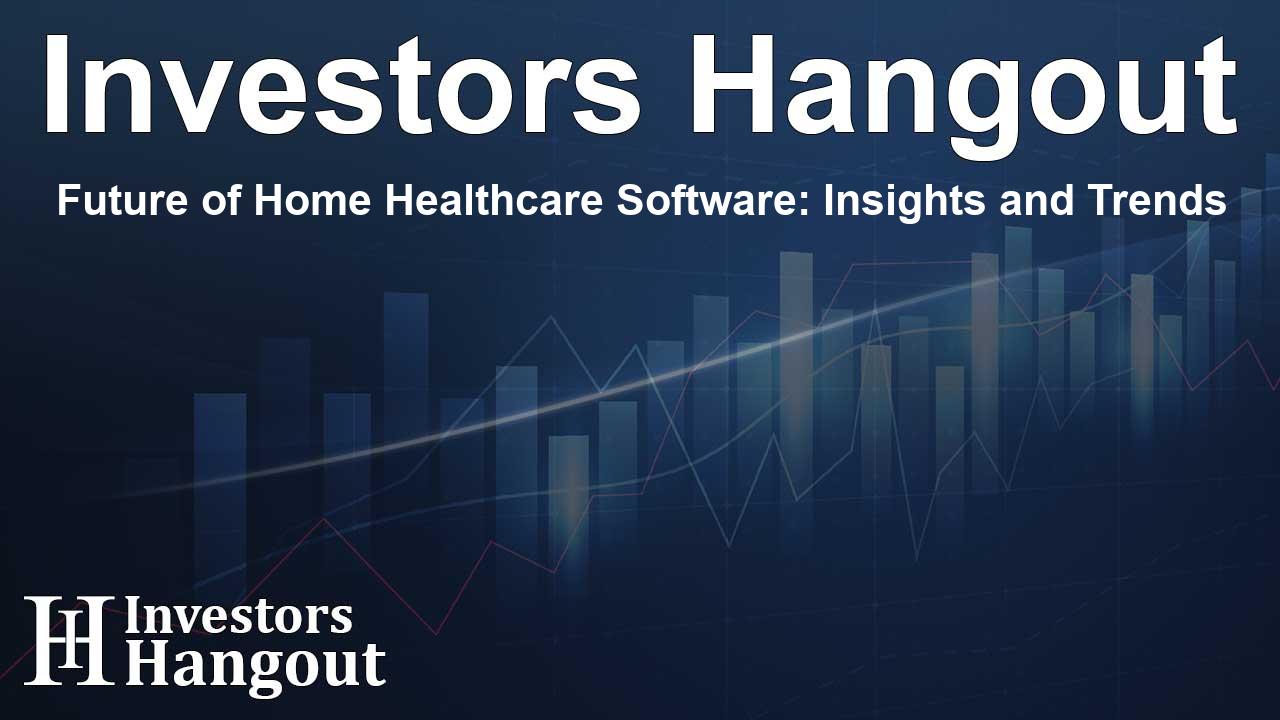Future of Home Healthcare Software: Insights and Trends

The Rise of Home Healthcare Software: Market Overview
The home healthcare software market is witnessing remarkable growth, with an expected valuation of USD 38.92 billion in the coming years. Currently valued at approximately USD 12.16 billion, the anticipated compound annual growth rate (CAGR) stands at 13.8% from 2024 to 2032. This growth can be attributed to several key factors, including an aging population, increased demand for home-care solutions, and continual advancements in technology that enhance patient management and operational efficiency.
Drivers Behind Market Growth
The rising preference for home healthcare services has substantially increased demand. Patients, particularly the elderly, are leaning towards receiving care in the comfort of their homes instead of conventional medical facilities. This shift is encouraging the development of innovative software solutions that facilitate better patient monitoring and management. The healthcare sector is also adapting to ensure lower hospital admission rates, which further necessitates advanced home healthcare systems.
Technological Advancements
Recent advancements in technologies such as cloud computing, telemedicine, and mobile applications have transformed the home healthcare landscape. These technologies empower healthcare providers to conduct remote monitoring, conduct virtual consultations, and manage real-time data more effectively. With these innovations, patients can now receive necessary care at home, creating a mutually beneficial scenario for both patients and providers.
Regulatory Compliance Factors
As the market for home healthcare software matures, providers are facing increased regulatory compliance requirements. This scenario necessitates investment in sophisticated software solutions that not only help healthcare providers adhere to laws but also improve overall service delivery standards. Moreover, the integration of artificial intelligence (AI) and machine learning (ML) into home healthcare software seems to be a growing trend, potentially enhancing personalized care and predictive analytics for improved patient outcomes.
Key Players in the Market
Several influential companies are significantly shaping the home healthcare software market. These include major players like ResMed, Agfa Healthcare, GE Healthcare, Siemens Healthcare, Veradigm, McKesson Corporation, Cerner Corporation, Epic, NextGen Healthcare, ClearCare Inc., and others. These organizations play a crucial role in creating innovative solutions that streamline operations within the home healthcare realm.
Market Segmentation
The home healthcare software market can be categorized based on various features. The primary software segment includes solutions such as Agency Management Software, which dominated the market with a commanding 35% share in 2023. This software essentializes operation management for healthcare agencies, streamlining scheduling, billing, and regulatory compliance processes.
Emerging Trends in Home Healthcare Software
Another promising segment is Hospice Software Solutions, predicted to grow rapidly at about 15% annually due to increasing demand for palliative care, especially for elderly patients. Additionally, Skilled Nursing Services lead the service categories, having a striking 40% share of the market. The demand for skilled nursing care at home is growing as more individuals with chronic conditions opt for treatments at home rather than hospitals.
Future Innovations
Looking ahead, Infusion Therapy is expected to emerge as the fastest-growing service segment in home healthcare, with a projected annual growth rate of 20%. Home infusion therapy is becoming increasingly vital, particularly for patients grappling with chronic diseases. Technological advancements are making home-based infusion more practical and appealing, contributing to this segment's impressive growth trajectory.
Recent Developments
Significant recent developments further highlight the growth in the home healthcare software market. For example, Heim Health recently secured £2.2 million in funding to innovate community-based healthcare delivery, focusing on scalable, technology-driven models to alleviate pressure on hospitals. Additionally, the FDA has introduced the "Home as a Health Care Hub" initiative, designed to transform homes into comprehensive healthcare systems using augmented and virtual reality technologies to enhance patient care and improve health equity.
Frequently Asked Questions
What factors are driving the growth of the home healthcare software market?
Key factors include an aging population, growing demand for home-based services, and significant technological advancements in patient management.
What is the expected market size of home healthcare software by 2032?
The market is expected to reach USD 38.92 billion by 2032, representing substantial growth from its current valuation.
Who are the main players in the home healthcare software market?
Notable companies include ResMed, GE Healthcare, Siemens Healthcare, and Cerner Corporation, among others.
Which segment of home healthcare is predicted to grow the fastest?
Infusion Therapy is expected to experience the fastest growth due to rising demand for home-based treatment for chronic illnesses.
How is technology impacting the home healthcare industry?
Technological innovations are enabling remote monitoring, improving patient care, and providing cost-effective solutions for healthcare providers.
About Investors Hangout
Investors Hangout is a leading online stock forum for financial discussion and learning, offering a wide range of free tools and resources. It draws in traders of all levels, who exchange market knowledge, investigate trading tactics, and keep an eye on industry developments in real time. Featuring financial articles, stock message boards, quotes, charts, company profiles, and live news updates. Through cooperative learning and a wealth of informational resources, it helps users from novices creating their first portfolios to experts honing their techniques. Join Investors Hangout today: https://investorshangout.com/
Disclaimer: The content of this article is solely for general informational purposes only; it does not represent legal, financial, or investment advice. Investors Hangout does not offer financial advice; the author is not a licensed financial advisor. Consult a qualified advisor before making any financial or investment decisions based on this article. The author's interpretation of publicly available data shapes the opinions presented here; as a result, they should not be taken as advice to purchase, sell, or hold any securities mentioned or any other investments. The author does not guarantee the accuracy, completeness, or timeliness of any material, providing it "as is." Information and market conditions may change; past performance is not indicative of future outcomes. If any of the material offered here is inaccurate, please contact us for corrections.